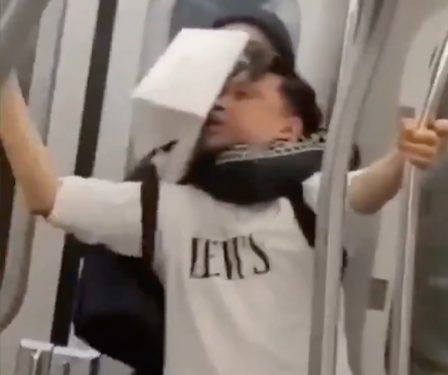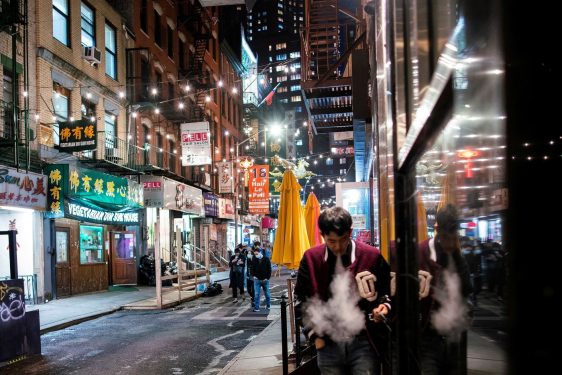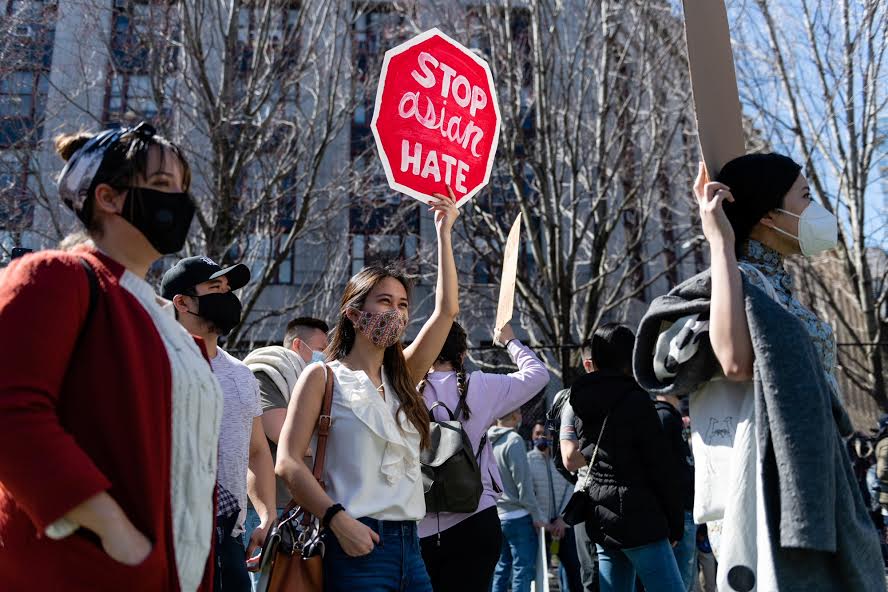Warning: Some of the images in this story might be upsetting to readers.
WINDSOR TERRACE — A recent headline-grabbing surge of anti-Asian violence has horrified New York and other cities in the U.S. — and sparked fear in China as well.
“My friends from China asked me, ‘Is it true or not?’ ” said Father Joseph Lin, C.M. “‘We saw it on the news. Horrible!’”

As the city is on the mend from a year of COVID-19 restrictions, fierce, unprovoked attacks on people of Asian heritage have erupted during the first few months of 2021.
Among them: a hammer strike to the head of a young woman from Taiwan. Another involved the stomping to the head of a man from China. Similarly, a Filipino woman was accosted, cursed, and battered while on her way to church.
Father Lin, a parochial vicar for Regina Pacis Parish in Bensonhurst, is a native of China, a nation often assailed for its government’s alleged human rights abuses.
But something perplexed him about the recent violence in the U.S.
“The people attacking the Asian people (here) are not the government,” he said. “They’re ordinary people who are attacking the Asian people.
“I think it is a hate crime.”
Through May 2, the NYPD was investigating 80 possible anti-Asian hate crimes. That number is subject to change as detectives determine the facts of each case; some may be reclassified. The total number of classified Asian hate crimes in 2020 through the same time period was 16 — the additional 64 cases is a boost of 400 percent.
The alleged perpetrators are of all races and ages, including those arrested or others still at large but whose images were caught on surveillance video. Still, Father Lin speculated that with so many incidents, there might be several motivations for the violence.
“Maybe they have their own problems, and they blame others,” he said. “Maybe there are mental issues. Or maybe it is the pandemic, and they blame others.
[Related: Flushing’s Main Street Patrol Aims to De-Escalate Anti-Asian Attacks]
“But the Asian people — they didn’t do anything wrong,” the priest insisted. “When people come to this land, it’s their home. They live here. They work here. Their children were born here. This is their country. They’re part of our society.”
‘We Sort of Made it OK’
Dr. Ray DiGiuseppe, a psychology professor at St. John’s University, believes the pandemic contributes to anti-Asian sentiments and violence but said there is more to it than that.
“In social psychology, there is a big difference in how we study aggression between groups as opposed to aggression in groups,” DiGiuseppe said.

He explained that “in-group” refers to activity within one’s circle of relationships, such as a family or community where everyone shares the same culture.
Between-group, or “out-group” aggression, he added, deals with a conflict between people of different factions, like nations or ethnicities.
“It’s not really talked about, but certainly in America, we have such strong identities as being different,” DiGiuseppe said. “And the more we see those differences, the more we see out-group aggression.
“People see themselves as competing for a disparity of resources — economic resources, jobs, money, housing, things like that. I think anger is an emotion that has evolved from a people’s desire to protect resources.”
This competition intensifies when diverse groups crowd into one area, like the teeming metropolis of New York City, DiGiuseppe said.
“It’s not like the other groups live over the river or in the next village,” he said. “We all live close together, in close proximity to each other.”
DiGiuseppe said this is not an example of xenophobia because that term refers to a phobia, or fear, of a different group; this, he said, is resentment.
The professor also said he suspects that mental illness plays less of a role in out-group aggression.
“Yes, we have too many mentally ill people who are not getting treatment,” he said. “Schizophrenic people do sometimes become angry, and they act on that, but they don’t pick victims based on ethnic identities.”
He added that their aggression stems from unstable ideas in their heads, “not well-organized thoughts about certain people.”
DiGiuseppe agreed that out-group resentment toward Asian residents grows as people associate them with the coronavirus’s first outbreak in Wuhan, China.
But he also noted that Asian cultures have long endured abuse throughout U.S. history. For example, he recounted how Chinese workers in the mid-1800s were viewed with contempt as they helped build the First Transcontinental Railroad.
The Department also hosts seminars on combating anti-Asian hate crimes, including self-defense techniques. The first one was held at a martial arts studio in Bayside, Queens.
🚨 WARNING: VIOLENCE/BLOOD 🚨
A person violently beats up and punches an Asian male in the head repeatedly in a Manhattan Bound (J) train at Kosciuszko Street Station, chokes him afterwards until he is unconscious. Be on the lookout for this person! pic.twitter.com/FCrqiPcxFc— Asian Dawn (@AsianDawn4) March 29, 2021
Tensions grew as the U.S. battled Japan in World War II and communists in Korea and Vietnam, DiGiuseppe said. Today, the ongoing political and economic competitions with China also feed distrust, he said.
“The Asian community has never really been welcomed with open arms in America,” DiGiuseppe said. “Because I think, in our country, we don’t view ourselves as a unified country.
“When was the last time we all saw ourselves as Americans? It probably hasn’t happened since 9/11. Certainly, it hasn’t happened during the pandemic.”
DiGiuseppe warned the aggression could get worse unless society clearly expresses its disapproval.
“Aggressive behavior is very much a result of modeling and an attitude that it’s acceptable,” he said. “We have sort of made it OK to be angry at minority groups in this country.
“But we really have to start thinking about people as being fellow New Yorkers, all on the same team.”
Decoy Detectives
As the violence increased, people called for a beefed-up response from the New York Police Department to protect the Asian community.
“I don’t think the city is doing enough to stop the attacking,” Father Lin said.
Mayor de Blasio did not respond to The Tablet’s request seeking comment about statements that the city isn’t doing enough. However, he did respond to the issue of anti-Asian violence during a media availability on May 3.
“We always have to do more,” the mayor said then. “I really mean that. We have to do more in every sense. We need all New Yorkers involved. We need people reporting everything they see.”
Mayor de Blasio urged people who witness anti-Asian violence to call the NYPD’s tip line, 805-577-TIPS(8477), or report online at nyc.gov/StopAsianHate.
In recent months, the NYPD added an Asian hate crimes task force to its Hate Crimes unit. The Department also formed a panel of community leaders to review circumstances of incidents to determine whether they meet the criteria for prosecuting a hate crime.
According to New York state law, a person commits a hate crime when the victim gets assaulted, robbed, or even killed “because of a perception or belief about their race.”
A tirade laced with slurs and accusations, no matter how ugly or racist, may not meet the criteria of a hate crime if there is no accompanying violence or other offense, including arson or trespassing.
For example, the new panel will advise police investigators and prosecutors whether the May 2 hammer attack on the woman from Taiwan was random or fueled by hatred for Asian people.
Police said the woman, 31, was walking with a friend on 42nd Street in Midtown Manhattan when she was bashed in the head with a hammer by another woman. The attacker reportedly ordered the victim and her friend to remove their masks, then swung the hammer.
“The facts must be assembled, and the elements of a hate crime must be proven in every instance where a hate crime is a possibility,” said NYPD Chief of Department Rodney Harrison.
The new panel, he explained, “is an additional step of determining what a hate crime is, and another layer of rigorous review to ensure that we get it right.”
But, while harassment or discrimination based on hate may not be criminal, it may be a form of “bias” that could go to a civil court, with a punishment in the form of monetary fines. People who suspect bias can call the city’s 311 hotline and say, “Human Rights.”
The victim in the May 2 incident suffered a cut to the head, but no arrest had yet happened a week later.
However, police did arrest a suspect in the savage April 23 beating of a 61-year-old unemployed immigrant from China. The victim, Yao Pan Ma, was collecting recyclables at Third Avenue and East 125th Street when Jarrod Powell, 49, allegedly knocked him to the ground and repeatedly stomped his head.
Ma remained in critical condition nearly three weeks later.
Police also arrested 38-year-old Brandon Elliot for the alleged attack on Vilma Kari, 65, on March 29 on West 43rd Street in Manhattan. Kari is Filipino, and Elliot was on parole after serving 17 years in prison for murdering his mother nearly 20 years ago. He reportedly cursed the woman and added, “You don’t belong here!”
Police said detectives made these arrests based on information from tipsters who saw reports of the attacks in the news or on social media.
Data from the NYPD Hate Crimes Task Force shows 42 incidents against Asians, with 17 arrests, between Jan. 1-March 31. By comparison, the city reported three anti-Asian crimes in all of 2019 and 28 in 2020.
The NYPD has also stepped up foot patrols in neighborhoods with significant populations of Asian residents. Undercover detectives of Asian heritage, deployed as decoys, have made a handful of arrests for alleged hate crimes, police said.

‘It is a Moral Issue.’
Father Vincentius Do, pastor of St. Agatha’s Parish in Sunset Park and the Brooklyn Coordinator of Ministry to Chinese Immigrants, said he had noticed the increased foot patrols by uniformed officers there.
Next month, Father Do will transfer to become pastor of St. Michael’s Parish in Flushing, Queens, a neighborhood that has seen several anti-Asian assaults since the first of the year.
Among them was the Feb. 16 shoving of a middle-aged Chinese woman, who crashed into a row of metal sidewalk newspaper boxes, suffering a deep cut to her head. Video of the incident generated a flurry of tips and the arrest of a suspect two days later.
“I’m sure I’ll have to deal with it there,” Father Do said of his pending transfer. “Thank God, in this neighborhood, we haven’t heard of anything in particular. Police have been very present, so I think that has helped.”
“The thing is, I think the pandemic brought out the worst in some people, and they’ve taken their frustrations out on certain groups,” he added. “But as a Church, we denounce any type of violence, whether it’s on Asian Americans, Spanish people, even the unborn.”
Father Lin agreed, adding that all people are made in the image and likeness of their Creator and thus deserve dignity and love. Therefore, an attack on one group is an attack on all children of God, he said.
“We have to seek justice, especially for the poor and for the vulnerable, to be their voice, to be heard.”
Father Lin called for more prayer to urge peace and healing.
“You can play a part, and I can play our part to promote peace,” he added. “So, when they (innocent victims) are attacked, of course, pray.”
Bishop Nicholas DiMarzio of the Diocese of Brooklyn recently said the Catholic faith has a role in healing the sin of racism, but the process starts with people.
“Every individual has to examine their conscience,” the bishop said. “And if they feel against other people with rancor or hatred, they need to change.
“No laws can ever be passed to change this. It is a moral issue, an individual issue that we should preach about at the church, and we have. We try our best, but that’s the only solution to this.”
